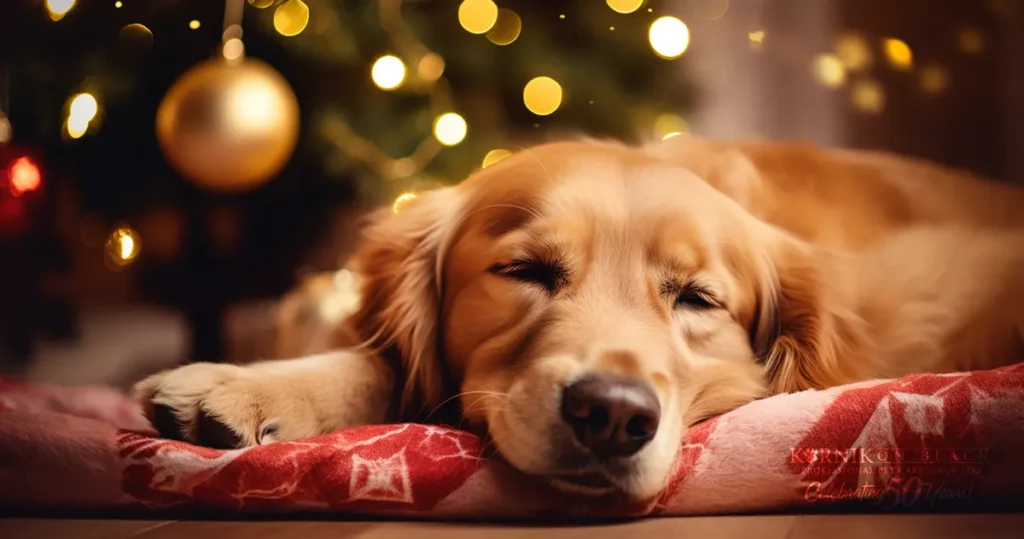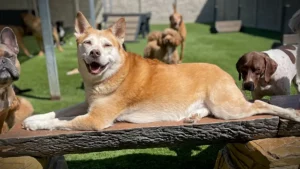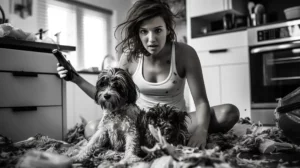The holiday season is a time of joy, festivity, and togetherness. As we decorate our homes, enjoy delicious meals, and gather with loved ones, we want our pets to be an integral part of the celebrations.
However, amidst all the merriment, it’s essential to be mindful of our furry friends’ safety. This article will provide you with valuable holiday pet safety tips to ensure that you and your pets have a safe and happy holiday season.
1. Festive Decorations
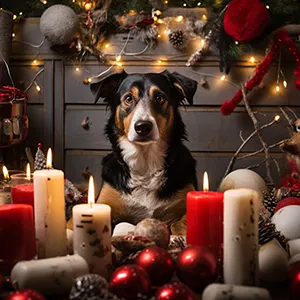
The holiday season fills our homes with wonder and excitement, shared by both us and our cherished pets. However, the festive decorations that make our homes sparkle can also pose risks to our furry companions. Here are the key points to remember:
- Tinsel Temptation: Shimmering tinsel can attract cats and dogs, but swallowing it can lead to dangerous blockages. It’s best to use alternative decorations or hang tinsel out of your pet’s reach.
- Ornamental Dangers: Delicate glass ornaments can injure pets if broken, and small ornaments can become choking hazards. To mitigate these risks, consider shatterproof ornaments or place fragile ones higher on the tree.
- Christmas Lights Cautions: Pets may chew on electrical cords, posing burn and shock risks. Secure cords, use pet-friendly cord covers, and supervise pets around lights.
- Climbing Cats and Curious Dogs: Cats may attempt to climb Christmas trees, risking toppling the tree or dislodging ornaments. Ensure the tree is secure and use pet gates to limit access. For dogs, keep ornaments out of their tail’s reach.
- Candle Caution: The cozy glow of candles can be hazardous if pets knock them over or come into contact with open flames. Opt for battery-operated candles or secure open flames.
2. Toxic Plants
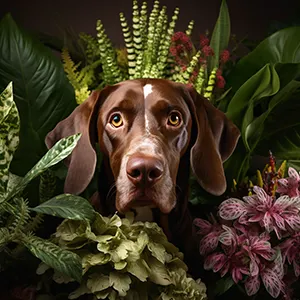
Despite their festive charm, holiday plants like poinsettias, mistletoe, and holly can pose hidden dangers to pets. These plants are known to be toxic to cats and dogs if ingested. To keep your pets safe, it’s crucial to be aware of the risks and take necessary precautions.
- Poinsettias: Poinsettias are a quintessential symbol of the holiday season, known for their vibrant red and green leaves. However, their leaves and stems contain a milky, white sap that can irritate the mouth and digestive system if ingested by pets. While severe poisoning is rare and usually mild, it’s best to place poinsettias out of your pets’ reach or opt for artificial varieties if you have curious pets in your home.
- Mistletoe: Celebrating the holidays at the emergency clinic would be far from romantic. That said, both American and European mistletoe species are toxic. Ingesting mistletoe can lead to symptoms like drooling, difficulty swallowing, vomiting, diarrhea, and, in severe cases, even heart problems. Ensure that any mistletoe decorations are placed high enough to be inaccessible to your pets or consider using artificial mistletoe for safety.
- Holly: Holly, with its distinctive glossy green leaves and bright red berries, is another holiday favorite. Unfortunately, holly berries and leaves are toxic to pets, causing symptoms like vomiting, diarrhea, and stomach upset. To protect your pets, place holly arrangements and decorations out of their reach and opt for pet-safe alternatives.
3. Holiday Foods and Treats
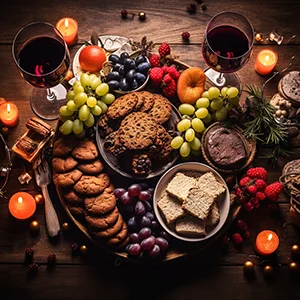
The holiday season brings an array of delicious foods and treats to our tables, but most are not safe for our pets. Certain holiday foods and treats pose risks that every pet owner should be aware of.
- Chocolate: This festive treat contains theobromine, a substance toxic to pets, especially dogs. Ingesting chocolate can lead to symptoms like vomiting, diarrhea, and more severe issues, so it’s crucial to keep it out of your pet’s reach.
- Bones: Cooked bones can splinter and pose choking hazards or harm your pet’s digestive tract. Instead of sharing, provide safe pet bones or treats as a suitable alternative.
- Rich, Fatty Dishes: The rich gravies and roasts that adorn holiday feasts can lead to pancreatitis in pets. This painful condition is best avoided by sticking to your pet’s regular diet.
- Alcohol: Alcoholic beverages, like eggnog or mulled wine, are toxic to pets and can result in coordination problems, respiratory distress, and more. Keep drinks out of their reach and clean up any spills promptly.
- Raisins and Grapes: Both raisins and grapes can cause kidney failure in pets and should be kept away from them.
Instead of sharing your holiday meal with your pet, provide pet-friendly treats or meals to include your pets in the festivities while maintaining their regular diet. This ensures a safe and healthy holiday season for your furry family.
4. House Guests and Escapes
The comings and goings of holiday guests can be exciting for pets, but they can also become overstimulated, which can lead to stress and potential escapes. Keep a close eye on your pets during gatherings, and provide a quiet, safe space where they can retreat if they become overwhelmed.
5. Pet Identification
Make sure your pets have updated identification tags and microchips. In the event they become lost, these measures significantly increase the chances of a safe return home.
6. Cold Weather Precautions
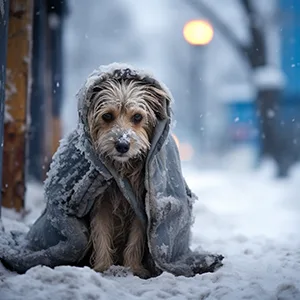
In colder climates, it’s important to prioritize the well-being of your pets by protecting them from the cold weather. Just like humans, pets can be sensitive to low temperatures. Here are some key points to consider:
- Warm and Comfortable Resting Place:
- Make sure your pets have a sheltered and warm place to rest, especially during colder seasons.
- If your pet stays outdoors, provide a well-insulated and draft-free shelter. This can be a doghouse or a designated area with proper protection from the elements.
- Cozy Bedding:
- Place comfortable and warm bedding in your pet’s sleeping area. This can include blankets, pet beds with insulation, or even heated pads designed for pets.
- Elevate the bedding slightly to prevent cold from the ground affecting your pet.
- Pet-Appropriate Clothing:
- Depending on the severity of the cold weather and your pet’s breed, you might consider dressing them in pet-appropriate clothing.
- Sweaters or jackets can provide extra insulation, especially for smaller or short-haired breeds. Ensure that the clothing is comfortable and doesn’t restrict their movement.
- Monitoring Your Pet:
- Keep an eye on your pet’s behavior during cold weather. If they seem uncomfortable, shiver excessively, or show signs of distress, it’s important to address their needs promptly.
- Consider adjusting their living arrangements or providing additional warmth if necessary.
Remember, each pet is unique, and their tolerance to cold can vary. It’s essential to pay attention to their individual needs and make adjustments accordingly to ensure they stay healthy and comfortable during colder seasons.
7. Emergency Contact Information
It’s always a good idea to have the contact information of a local emergency veterinarian on hand. In case of a pet-related emergency, quick access to professional help is essential.
8. Travel Safety
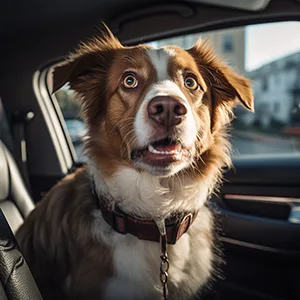
Holiday travel often includes bringing your beloved pets along, but their safety and comfort are top priorities. Here are essential tips for a smooth and secure journey:
- Pet Restraints: Use pet seat belts or travel crates to keep your pet secure during car trips to prevent distraction and injury.
- Familiarity and Comfort: Bring their favorite items to ease anxiety. Acclimate them to car travel with short trips if they’re not used to it.
- Regular Breaks: Schedule breaks for stretching, bathroom, and refreshments every few hours to prevent motion sickness.
- Identification and Documents: Ensure proper identification and carry medical records, especially when crossing borders.
- Pet-Friendly Accommodations: Book pet-friendly lodgings in advance, and check for amenities that cater to pets.
- Plan for Unforeseen Situations: Carry a pet first-aid kit, extra supplies, and medications to prepare for emergencies or delays.
- Consideration for Air Travel: Research airline pet policies and adhere to guidelines when traveling by air.
Simplify Your Festivities with Karnik On Black
You could just skip all the hassles of pet travel and instead, treat your furry friends to a relaxing stay at Karnik On Black. With our professional pet care services, including lodging, grooming, group play, and individual daycare, your pets will enjoy a comfortable and secure stay full of fun activities!
It’s a convenient alternative that ensures your pets are well taken care of, allowing you to celebrate the season without all the stress.
Keeping Our Pets Safe This Holiday Season
By following these holiday pet safety tips, you can ensure that your furry family members join in the festive spirit safely. The holidays can be a magical time for both humans and our pets, and a little extra care and precaution go a long way in keeping them healthy, happy, and stress-free during this special season.
This holiday season, let’s celebrate with our pets and keep their tails wagging in joy and safety. Wishing you and your furry friends a wonderful and hazard-free holiday season!

